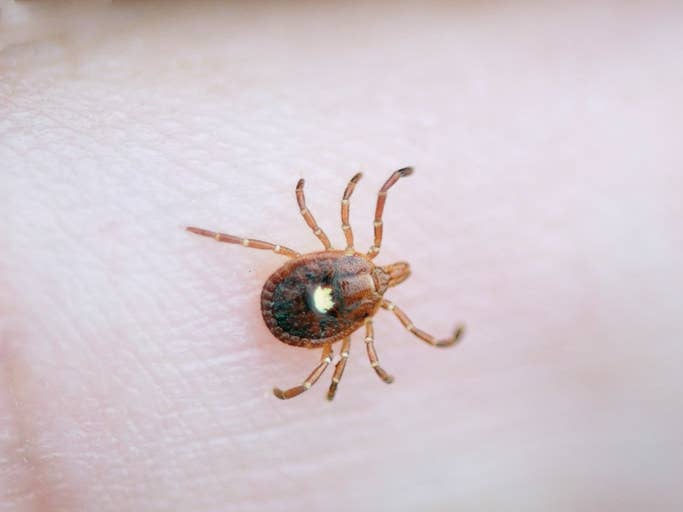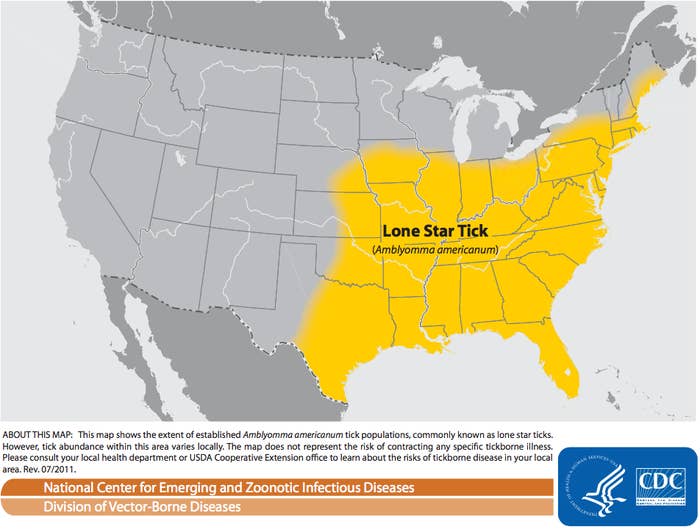This is a lone star tick. It's found mostly in the Southeastern US, and the adult females have a distinctive white dot on their back.

In some cases, people who are bitten by the tick are thought to develop an allergy to red meat, such as beef, pork, or venison. The meat allergies are relatively new, first recognized in the US about 10 years ago.
The tick's bite is thought to cause the body to react to a complex sugar molecule (galactose-alpha-1, 3-galactose, or alpha-gal), which is found in meat, Dr. Jay Lieberman, the vice chair of the American College of Allergy, Asthma, and Immunology's Food Allergy Committee, told BuzzFeed News.
Now a new study from a Memphis clinic finds that tick-triggered meat allergies are the number one cause of anaphylaxis, a serious and potentially life-threatening allergic reaction.
Lieberman and his colleagues looked at 218 people who were treated for anaphylaxis at the clinic over a 10-year period, including 85 with a clearly identified trigger. Of those, 33% of the cases were due to alpha-gal — even more than those caused by other foods, insect venom, or medications, according to the report published this week in the journal Annals of Allergy, Asthma & Immunology.
"If you have symptoms that are consistent with anaphylaxis and you haven’t been able to figure out why, this is a more than reasonable thing to seek out," Lieberman said, "especially If you live in Central to Southeast United States."
About 30 to 60% of the time, doctors can't figure out what causes these serious allergic reactions, said Lieberman, who is an associate professor at the University of Tennessee Health Science Center in Memphis. In fact, historically, almost 60% of cases at the clinic didn't have an identifiable trigger.
After alpha-gal allergies were found to be a thing and clinics could test for them, that number dropped to 35%, suggesting that the meat allergies may be responsible for more mystery cases of the serious reactions than previously thought.
Lone star ticks can be found from Maine to Texas, but they are most common in the South.

Although alpha-gal allergies are on the rise they are still rare. About 5,000 people in the US are thought to have alpha-gal allergies, up from 3,500 a couple years ago, according to a recent report.
But not all people who are bitten by ticks develop the allergy, and even some people who have an alpha-gal antibody in their blood may not have symptoms after eating meat.
"Number one, don’t freak out," said Lieberman. "Just because you’ve been bitten by a tick doesn’t mean you have it, and even if you have been bitten by a tick and you have the allergic antibody, still most of these patients don’t have the symptoms."
Although the ticks are found in more parts of the country than they were in the past, they are still mostly a problem in the South, Lieberman said. "I would definitely not expect this to be high in California, Washington state, or Montana," he said.
The alpha-gal symptoms aren't exactly like other life-threatening allergic reactions, because they can sometimes occur hours after eating meat.

Most of the time, life-threatening allergic reactions come on fast, sometimes within minutes. That's not the case with alpha-gal, said Lieberman. In the cases he's seen, people often experience symptoms hours after eating meat, including very bad itching, typically with hives, in addition to stomach symptoms.
"The kind of classic thing is that someone wakes up in the middle of the night, doubled over with belly pain, cramps, and really itchy skin," he said.
Few other anaphylaxis cases occur in the middle of the night, Lieberman said. "So if you do have anaphylaxis in the middle of the night, for me, that’s the first thing I think of."
No one is really sure why the allergic reaction is delayed. While almost all other allergies are triggered by a reaction to a protein, alpha-gal is a sugar molecule that is attached to a protein, Lieberman said. The theory is that the body processes that molecule slightly differently, and that’s why the reaction is delayed, he said.
Anaphylaxis is a medical emergency that warrants a 911 call. It requires rapid treatment with epinephrine, which is the drug in EpiPen autoinjectors. Other anaphylaxis symptoms can include an itchy mouth, lips, and throat; face and throat swelling; trouble breathing; a drop in blood pressure; an impending sense of doom; and even cardiac arrest.
You can get helpful tips on avoiding tick bites from the Centers for Disease Control and Prevention.
CORRECTION
The alpha-gal molecule is found in all mammals except primates, which includes humans. An earlier version of this post said the molecule could be found in humans.
